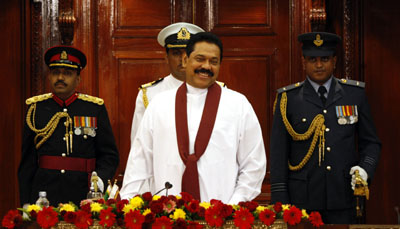The end of Sri Lanka’s war with Tamil rebels has not eased repression of independent media. Journalists still face violence, harassment, and detention. Will President Rajapaksa use his victories on the battlefield and in the polling booth to reunite the nation and restore free expression? A CPJ Special Report by Bob Dietz and Robert Mahoney
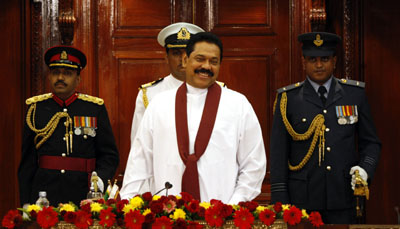
Posted May 19, 2010
COLOMBO, Sri Lanka
Sandhya Eknelygoda remembers saying goodbye to her journalist husband at 7:30 a.m. on January 24 as he left to cover the final campaigning in Sri Lanka’s presidential election. She has not heard from him since.
More in This Report
• CPJ’s recommendations
• Still failing a year later
• Jaffna’s media minefield
• Database of murdered
Sri Lankan journalists
At the family home in a distant Colombo suburb, Sandhya rubs her hands as she recounts her attempts to penetrate a police bureaucracy that appears to be in no hurry to investigate the disappearance of Prageeth Eknelygoda, a political reporter and cartoonist for the pro-opposition news Web site Lanka eNews. Sandhya went to her local police station to report Eknelygoda’s disappearance on the night he failed to return home, but police refused to open a case, saying they thought his disappearance was a publicity stunt. They finally accepted her complaint two weeks later—but when she visited the station soon after to ask for a copy, police told her they had lost the logbook in which it had been entered.
“In the end, the government must take responsibility for this investigation,” she told CPJ through an interpreter. National Police spokesman Prisantha Jayakody told CPJ the case has been transferred from local police to the Colombo Crimes Division but no witnesses or suspects had been questioned.
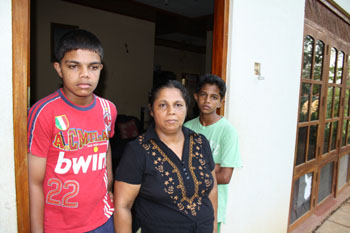
Eknelygoda’s disappearance sent a chill through an already traumatized Sri Lankan press corps. If the end of the 26-year war with Tamil secessionists in May 2009 had raised hopes that the government of President Mahinda Rajapaksa would relax its grip on the media, such optimism had nearly evaporated by the time of the bitterly divisive presidential campaign. Rajapaksa beat back a challenge from his former ally, Sarath Fonseka, the army general who crushed the rebels, in the January 26 presidential election. But the strength of Fonseka’s showing among Rajapaksa’s Sinhalese base rattled the administration.
Fonseka was arrested after the election on charges of participating in politics while in uniform, and media outlets that supported him, such as Lanka eNews, came under threat, according to a wide array of journalists, political analysts, and diplomats interviewed by CPJ.
Journalists described working in a climate of fear and intimidation. Many said they hold back from publishing stories that could embarrass Rajapaksa or members of his family who also hold public office. They assume their phones and e-mail are tapped. When exchanging e-mails with CPJ about a possible meeting, for example, one prominent journalist said any encounter “would need to be VERY well planned. Take NO chances. Everything is being monitored.”
Under attack, many seek exile
Fearing government retribution, many of those interviewed asked to have their identities protected. One staffer at Sirasa TV, a station that had its master control room wiped out by a bomb in 2009, described a “continuous undertone of threat. … There is always a danger and an element of doubt about safety.” By CPJ’s count, 25 Sri Lankan journalists are now living in exile. Several more said that they expect to leave if the repression continues.
They can expect little help from local press freedom groups, which have also have come under threat. Sunanda Deshapriya, a leader of the Free Media Movement (FMM), a press support group, is now living in exile in Geneva. He fled the country in 2009 in fear for his life after being denounced as a traitor on government Web sites and excoriated on call-in radio shows. FMM members say they are under constant surveillance and are condemned in the pro-government media. FMM’s acting spokesman, Sunil Jayasakera, went into hiding after the presidential election. In the past, the government accused the group of being paid by the rebels; postwar, it accuses the FMM of illegally taking money from Western governments and human rights groups.
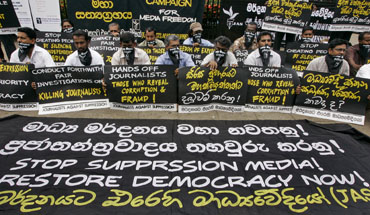
Among those journalists who have fled is Lanka eNews Editor Sandurwan Senadeera. In the five years he ran the site, he was often questioned by police but never detained for a long period and never charged with a crime. He had his newsroom staff work in groups for safety, and no one was allowed to leave the newsroom alone or after dark. Shortly before his exile in March, Senadeera considered closing the Web site’s offices and having everyone work from separate locations. For now, the site continues to operate under temporary leadership with staff working from their homes.
“When there was a legal process, I wasn’t worried. I had done nothing wrong,” Senadeera said when he spoke with CPJ in February. “But when they grabbed Prageeth Eknelygoda, then I knew that the world had changed and that period was over in Sri Lanka. I knew the laws didn’t apply anymore.
“I have three options: abandon the Web site, fight the government, or get ‘disappeared,’” he said. “I don’t feel defeated, but I do feel fed up.” A week after making these remarks, Senadeera fled to the United States to stay with a relative.
Some journalists have left permanently; others wait for the heat to die down and return, although they inevitably dial back their critical reporting and commentary. The authorities are well aware of the flight option. Chandana Sirimalwatte, chief editor of the Marxist weekly Lanka, said a police officer told him while he was being questioned: “Look at this detention as an opportunity. After this you can easily move to a European country.”
Sirimalwatte told the police he was staying put—even though his office is under police surveillance, he has difficulty finding printers for the paper, his distribution company has received anonymous threats, and his newsprint supplier told him to find another company.
A senior Sri Lankan journalist working for a prominent foreign news outlet said he understands why his colleagues are leaving. “Who can guarantee the lives of these people? My company will look after me if anything happens to me, but who will look after the Sri Lankans who do not have support? When their lives are threatened, they have to leave,” said the journalist, who spoke on condition of anonymity for security reasons.
The backdrop to this fear is impunity. In April 2010, CPJ ranked Sri Lanka as the fourth worst nation worldwide on its Impunity Index, a list of countries where journalists are regularly murdered and governments fail to solve the crimes. In February 2009, CPJ investigated what one Sri Lankan journalist called a “spasm of violence” against the media in the preceding month. The attacks, which included the murder of columnist Lasantha Wickramatunga, were aimed at silencing critics on the home front during the final assault on the rebel Liberation Tigers of Tamil Eelam (LTTE). In its 2009 special report, “Failure to Investigate,” CPJ found a pattern of unpunished violence against the media throughout Rajapaksa’s tenure.
The January 2009 cases remain unresolved, illustrating the government’s continued inability or unwillingness to pursue justice in anti-press attacks.
Adding to the journalists’ sense of vulnerability is the case of J.S. Tissainayagam, who was honored with CPJ’s International Press Freedom Award last year. In August 2008, he was sentenced to 20 years in prison under Sri Lanka’s Prevention of Terrorism Act in connection with two articles written nearly three years earlier in a now-defunct magazine, North Eastern Monthly. His crime was documenting human rights abuses by the military and the difficult conditions faced by those displaced in the war.
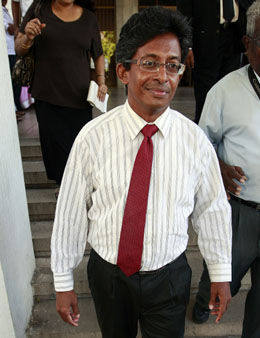
After a vigorous international campaign, Tissainayagam was released on bail in January 2010 pending his appeal. Fearing for his safety, living in self-imposed seclusion, and prohibited from leaving the country, Tissainayagam served as an example to other journalists of what could happen to them should they run afoul of the government. The country’s recently appointed external affairs minister, G.L. Peiris, announced at a press conference on May 3, World Press Freedom Day, that Tissainayagam had been given a presidential pardon. His security, though, remains a concern.
As a result of recurring violence and harassment, self-censorship is rampant among the island’s highly partisan press, which publishes in three languages, Sinhala, Tamil, and English. In the pro-establishment media, many editors acknowledge self-censorship while devoting their front pages and news-hour lead stories to extensive, positive coverage of the government. Among the pro-opposition media, there is a pervasive atmosphere of concern, if not outright fear, about the future of the country’s media and their personal safety. Independent editors say they are reluctant to run stories supportive of Fonseka, or that question the armed forces, military procurement, or the political and business dealings of senior administration officials.
“It used to be us Tamil journalists who had to be careful,” said an editor at a Tamil-language newspaper who asked not to be identified for his own safety. “Now our Sinhalese colleagues know what it is like.” Tamil editors still exercise “supreme caution” in running stories critical of the government, the army, or pro-government Tamils of the so-called Karuna faction, a breakaway group of the LTTE in the east of the country. “We often get the story first but we wait until it appears in the English papers before we publish it [in Tamil],” the editor said.
With conflict over, government commits to ‘normalcy‘
Ethnic tensions between the country’s minority Tamils and Sinhalese, coupled with a war that cost by U.N. estimates 100,000 lives, have left their mark on the media, which are divided along sectarian as well as political lines. But journalists say the intensity of the political battle between Rajapaksa and Fonseka drove the media to new heights of partisanship, and consequently has exposed some journalists to new dangers.
Prabath Sahabandu, editor-in-chief of the pro-government daily The Island, accused some journalists of professional misconduct. “Some journalists are very partisan,” he told CPJ. “They are more politicians than journalists. And some Web sites, I won’t call them journalism at all. They publish very scurrilous material. They character-assassinate politicians. That doesn’t mean that the government has the right to suppress the media and resort to strong-arm tactics. That is also wrong. But we also have to turn the searchlight inwards and ask some critical questions.”
The level of professionalism and training of journalists may be an issue, but CPJ has concluded that it’s not the main problem in a country where murder, forced disappearances, brutal physical assault, and exile mark the media landscape. Western governments have long condemned Sri Lanka’s human rights record and wartime conduct, prompting Colombo to look for less critical partners. The government turned to Pakistan and China for arms to finish off the Tamil rebellion; Iran is supplying oil and financing for a power station, and China is building an airport and seaport.
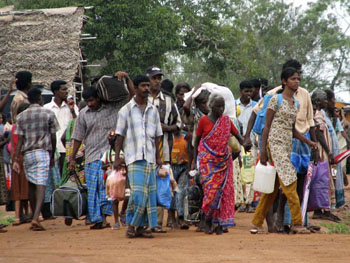
But if Western countries’ ability to influence human rights and press freedom has waned, the United States and the European Union still constitute important markets for Sri Lankan exports, especially textiles. In reviewing the island’s human rights record, the European Union has said it will suspend preferential tariffs for Sri Lankan apparel imports in August unless the Colombo government shows improvements in human rights, including freedom of expression, EU officials said. The suspension of the Generalized System of Preferences known as (GSP+) could deal a severe blow to the industry and jeopardize up to 200,000 jobs, the officials said. The EU accounts for 35 percent of the Sri Lankan textile export market. So far the government has left many of the EU concerns unaddressed and has sought to play down the economic importance of the GSP+ to the country, Western officials said.
Nevertheless, Attorney General Mohan Peiris, in a lengthy February interview with CPJ at his Colombo office, said the administration was committed to the rule of law and was supportive of a free and responsible press. “The government has a zero tolerance policy with regard to any kinds of acts of violence perpetrated against journalists,” he said. Asked about Sri Lanka’s culture of impunity, Peiris said nearly 30 years of war and terrorism had brought its own imperatives.
“Now that things are back to normal, and terrorism is no more, I think the time is right, and I am fairly sure the government has the same view, that we should now put those structures back so that civil life returns to normalcy as quickly as we can,” he said.
Peiris urged exiled journalists to return and said they were needed to rebuild the country. When CPJ brought up the case of Tissainayagam and asked whether he would be pardoned, Peiris responded: “If sufficient contrition is shown on the part of Tissainayagam we can visit his case generously, with something that might be worthy of being spoken of. And your suggestion that we consider a pardon is something that we can seriously consider. I can seriously tell you that. I will convey that sentiment to His Excellency [President Rajapaksa] in due course.” The government would announce the pardon more than two months later, although details, including possible restrictions on Tissainayagam, were not disclosed.
Before leaving that February day, CPJ handed the attorney general a short handwritten letter in Sinhala from Sandhya Eknelygoda asking for news of her husband. She is still waiting for a response.
Bob Dietz is CPJ’s Asia program coordinator. Robert Mahoney is CPJ’s deputy director.
CPJ’s Recommendations
To the Sri Lankan government:
Denounce threats. President Mahinda Rajapaksa should publicly and forcefully denounce all threats and attacks against the news media, including outlets that are critical of its policies. The president should honor the constitution, which guarantees freedom of expression, and the country’s international commitments by ensuring that independent and critical media can work freely and without fear of reprisal.
Prosecute unsolved attacks on the press. The government should establish an independent investigative unit to specifically address crimes against freedom of expression. Authorities should further bring indictments and win convictions in a series of anti-press attacks that have occurred over the last decade. Sri Lanka’s record of impunity in press attacks ranks as one of the worst in the world, CPJ research shows. Ten journalists have been murdered over the last decade for their coverage of civil war, human rights, politics, military affairs, and corruption. Not a single conviction has been obtained in any of the cases.
Guarantee safe return. Provide explicit public guarantees to protect journalists who return from forced exile. Allow the international community and countries that have given safe haven to Sri Lankan journalists to act as observers to ensure safe return.
Repeal punitive laws. The government should repeal the Prevention of Terrorism Act of 1972, which was used to convict journalist J.S. Tissainayagam, and the Official Secrets Act of 1956. Both are overly broad and allow the government to intimidate and silence its critics.
Permanently disband press council. The government should abandon plans to reactivate the Press Council, which has the power to impose financial and prison penalties against journalists, and should move to permanently disband this body.
To the United Nations:
To the international community:
Actively engage. The diplomatic community must continue active engagement with the Rajapaksa government. The United States and Norway are vocal in support of journalists under attack in Sri Lanka. They should continue their activities and enlist nations such as India and Japan, which have not been sufficiently active, to join with them in presenting a united front in support of press freedom. Each one of these countries should publicly express its concern.
Use GSP+ as leverage: The EU should use the possible suspension of preferential tariff benefits (known as GSP+) to extract meaningful guarantees of media freedom from the government, including the prosecution of anti-press attacks and the guaranteed safe return of exiled journalists. The suspension, decided on in February, will take effect in August if Sri Lanka fails to take the necessary measures to enact improvements in its human rights condition.
Improve quality. The international community should work to improve the quality of journalism education and career training within Sri Lanka’s existing institutions—the Sri Lanka College of Journalism at the Sri Lanka Press Institute. Governments and international organizations should also offer overseas training to all journalists across the political spectrum.
EDITOR’S NOTE: This report has been modified to reflect that it was published on May 19, 2010.
